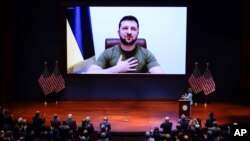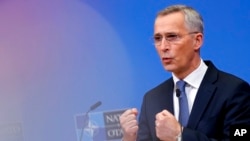Ukraine’s president on Wednesday urged U.S. lawmakers to do more to protect his nation amid a three-week onslaught by Russian forces, evoking some of the worst traumas of American history to ask Congress and President Joe Biden to give more military assistance and impose a no-fly zone over Ukraine’s besieged skies.
Watch the address:
Russia continued attacks on Ukraine’s capital, Kyiv, Wednesday, as NATO ministers gathered in Europe to discuss Russia’s invasion.
"Right now, the destiny of our country is being decided," Ukrainian President Volodymyr Zelenskyy said, speaking virtually to a packed session of U.S. lawmakers in a speech that evoked the painful memories of Japan’s 1941 attack on Pearl Harbor, which spurred the U.S. to enter World War II; and the Sept 11, 2001 terror attacks, which launched the U.S.'s multi-front, two-decade-long Global War on Terror.
The 44-year old actor-turned-president, who spoke in English for part of his speech, also raised the more inspiring parts of American history, including the words of civil rights leader Martin Luther King, Jr.
"I need to protect our sky," said Zelenskyy. "I need your decision, your help, which means exactly the same, the same you feel when you hear the words 'I have a dream.'"
He reiterated his request for a no-fly zone – a request the White House has said would put the U.S. into direct confrontation with Russia.
"We disagree with the argument that that would be an effective step," White House press secretary Jen Psaki said (on Tuesday). "Because a no-fly zone, which often – people – shorthand, essentially means us shooting down Russian planes and them potentially shooting back at us."
Zelenskyy’s speech follows similar addresses to Britain’s House of Commons, Canada’s parliament and the European Parliament in recent weeks as he pushes for more military and humanitarian support from the international community.
Instead, Washington is pursuing what officials say are harsh and effective sanctions against Russia, with a special focus on the wealthy elites who surround Putin. To that end, U.S. Secretary of the Treasury Janet Yellen and Attorney General Merrick Garland met virtually on Wednesday with officials from Australia, Canada, Germany, France, Italy, Japan, the United Kingdom, and the European Commission, to launch the Russian Elites, Proxies, and Oligarchs multilateral task force.
Russian President Vladimir Putin seems to be unfazed by the opposition, and told Russian media on Wednesday that he will continue what he describes as a "special operation" in Ukraine.
"The West is trying to convince its citizens that their difficulties are the result of Russia’s actions, but this is a lie," Russian media quoted Putin as saying.
NATO meets
NATO Secretary General Jens Stoltenberg said members in Brussels would be discussing both the “immediate consequences of Russia’s invasion” and long-term efforts to strengthen NATO’s collective defense.
“NATO has a responsibility to ensure that this crisis does not escalate beyond Ukraine, and that's also the reason why we have increased the presence in the eastern part of the alliance,” Stoltenberg told reporters.
He has said potential actions could include placing “substantially more forces” in the eastern area, along with increases in naval and air deployments, missile defense systems and holding larger and more frequent military exercises.
U.S. Defense Secretary Lloyd Austin highlighted support for Ukraine’s ability to defend itself as well as U.S. commitment to aid any NATO ally that comes under attack.
“I think our presence here sends a signal to the world that we remain united in our support of Ukraine, and we condemn Russia’s unprovoked and unjustified invasion into Ukraine,” Austin said.
Russia has objected to NATO’s presence near its borders and sought a guarantee that Ukraine will never join the alliance. NATO insists countries are free to make their own decisions about security ties.
While Ukraine is not part of NATO, seven NATO countries share borders with Russia, Ukraine or Russian ally Belarus, and that proximity has raised concerns of a wider conflict.
Stoltenberg said there are 100,000 U.S. troops in Europe and another 40,000 troops under direct NATO command, as well as hundreds of thousands more on heightened alert across NATO nations.
U.S. President Joe Biden is scheduled to speak at the White House Wednesday, unveiling $800 million in new aid to Ukraine that will push the total amount of assistance announced by the United States during the past week to $2 billion.
He is due to join other NATO leaders in Brussels for a summit taking place March 24, the one-month anniversary of Russia launching its invasion after denying for months it planned to do so.
On the ground in Ukraine, the country’s emergencies agency reported a 12-story residential building was among the targets hit by Russian forces.
Despite continued shelling of Kyiv and other cities, Russian ground forces are making “limited to no progress … in achieving their objectives” in Ukraine, a senior U.S. defense official said Tuesday in an assessment shared with VOA.
The official said Kyiv “remains under heavy bombardment by long-range fire, with civilian targets to include residential areas being struck with increasing frequency. But leading elements of Russian forces have not appreciably advanced on the city.”
Negotiations between Russia and Ukraine continued Tuesday, and while previous rounds yielded no major breakthroughs, Zelenskyy said in a video message early Wednesday that there were some signs of progress.
“The meetings continue, and, I am informed, the positions during the negotiations already sound more realistic. But time is still needed for the decisions to be in the interests of Ukraine,” he said.
Zelenskyy suggested a compromise on Tuesday, saying Ukraine was ready to accept security guarantees that fall short of its goal to join NATO.
“If we cannot enter through open doors, then we must cooperate with the associations with which we can, which will help us, protect us ... and have separate guarantees,” Zelenskyy said.
Kremlin spokesperson Dmitry Peskov said it was premature to predict whether the peace talks will lead to progress.
“The work is difficult, and in the current situation, the very fact that (the talks) are continuing is probably positive,” Peskov said.
The United Nations said Tuesday the number of people who have fled Ukraine since the invasion began had reached 3 million.
VOA’s White House bureau chief Patsy Widakuswara and national security correspondent Jeff Seldin and Congressional correspondent Katherine Gypson contributed to this report.
Some information also came from The Associated Press, Agence France-Presse and Reuters.








